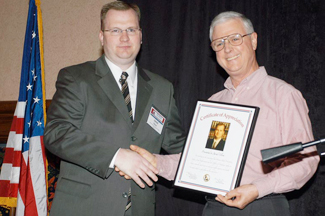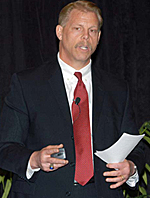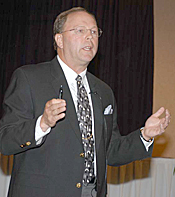
| CONNECTIONS |
IDAHO
ITD
HOME
511 TRAVEL SERVICES
IDAHO
DMV
ITD
NEWS
HIGHWAY
SAFETY
IDAHO STATE POLICE
STATE OF IDAHO
NIATT
NATIONAL
AASHTO
AAMVA
AAA of IDAHO
FEDERAL HIGHWAYS
FEDERAL AVIATION
IDAHO STATE POLICE
NHTSA
NTSB
TRB
U.S. DOT
TRANSPORTER
Archives
Milestones
Comments
Idaho
Transportation
Department
Office of Communications
P.O. Box 7129
Boise, ID 83707
208.334.8005
Fax: 208.334.8563

Highway safety summit emphasizes benefit
of enforcing traffic laws
 Law enforcement officers and highway safety professionals heard a common message during the 2008 Highway Safety Summit -- that increased enforcement of traffic laws not only saves lives, but helps reduce overall crime rates and aids teenagers in becoming safer drivers.
Law enforcement officers and highway safety professionals heard a common message during the 2008 Highway Safety Summit -- that increased enforcement of traffic laws not only saves lives, but helps reduce overall crime rates and aids teenagers in becoming safer drivers.
The summit, sponsored by ITD’s Office of Highway Operations and Safety (OHOS), was held Tuesday (May 13) in Boise and featured the theme “Smart Choices Save Lives.”
“Traffic enforcement leads to less overall crime,” said Oklahoma County Sheriff John Whetsel. “Oklahoma County reported a decline of more than an 80 percent in overall crime as traffic law enforcement increased by 80 percent.”
He went on to tell about 180 summit participants that he had a personal stake in traffic safety. Whetsel’s wife and 2-year-old daughter were killed in 1980 when an Oklahoma Highway Patrol trooper in pursuit of a speeding motorcyclist crashed into the family’s car.
Whetsel is a nationally recognized authority on police pursuits who has testified before Congressional committees and legislative hearings. He also has appeared on many television news and talk shows, including “Larry King Live,” “Dateline” and “NBC Nightly News.”
 Brandon Ibarra, a senior at Snake River High School in Blackfoot, offered the law enforcement officers attending some surprising advice during his talk about how teenagers receive highway safety messages.
Brandon Ibarra, a senior at Snake River High School in Blackfoot, offered the law enforcement officers attending some surprising advice during his talk about how teenagers receive highway safety messages.
“Police officers give too many warnings to teens,” Ibarra said. “Don’t give the warning, give the ticket. Kids need to know that there are boundaries.” He added that young people believe traffic safety laws aren’t always well enforced and, as a result, don’t tend to take highway safety messages seriously.
An attitude persists among young people that, “People my age don’t die, old people do,” he said.
Ibarra lost a best friend in a reckless driving crash during his sophomore year in high school. Since then, he has become an advocate for safe teenage driving habits in Bingham County and spoke before state representatives at the National Organization for Youth Safety and State Farm’s Youth Driving Conference in Washington, D.C.
The biggest distractions to teenage drivers in a car are other teenagers and cell phones, according to Capt. Mark Cowley, with the Bingham County Sheriff’s Office. Cowley has worked with the Blackfoot/Bingham County Youth Coalition the past seven years.
Cowley talked about “Project Ignition,” a national peer-to-peer driving safety program sponsored by the National Youth Leadership Council and State Farm.
Both Ibarra and Cowley were invited to participate in the First National Teen Driving Safety Summit in Washington, D.C., in October 2007.
Reducing a 15-minute citation process to a one- or two-minute contact was the topic of discussion for Sgt. Tommy Briggs of the Ada County Sheriff’s Office. Briggs has been working with electronic citation equipment purchased with grant funds provided by OHOS.
“This eliminates any possibility of handwriting errors and streamlines the process of ticket writing and crash reporting,” Briggs said.
 Traffic crashes are the leading cause of death for persons between the ages of 4 and 34, according to Lowell Porter (right photo). Porter served as chief of the Washington State Patrol before being appointed director of the Washington Traffic Safety Commission in 2005. He now works for Cambridge Systematics Inc. as a senior associate in transportation safety practice and serves on several national highway safety commissions and boards.
Traffic crashes are the leading cause of death for persons between the ages of 4 and 34, according to Lowell Porter (right photo). Porter served as chief of the Washington State Patrol before being appointed director of the Washington Traffic Safety Commission in 2005. He now works for Cambridge Systematics Inc. as a senior associate in transportation safety practice and serves on several national highway safety commissions and boards.
He told summit participants that no other activity engages the police with the public more than traffic safety. He added that while highway safety initiatives can draw mixed support from the public and often require more police work and resources, traffic enforcement leads to seized contraband and criminal arrests about 13 percent of the time.
“Criminals are found behind the wheels of cars,” Lowell said.
He also talked about issues surrounding racial profiling, or biased policing, and the impact on law enforcement.
“Trust is earned or lost each time we interact with the public,” Lowell said. “Building trust and confidence in the police is an on-going process and should receive constant attention.”
“Minority communities want law enforcement agencies to take a pro-active approach to relationship building and provide regular communication during the normal course of business,” he explained. “Not just when things go bad.”
 He outlined the goals of the state of Washington’s nighttime seat belt enforcement project and talked about the enforcement strategy.
He outlined the goals of the state of Washington’s nighttime seat belt enforcement project and talked about the enforcement strategy.
“We told people exactly how, where, when and by whom,” he said. “This wasn’t about writing tickets, it was about getting more people to wear their seat belts.”
Officers Kyle Wills and Eric Simunich, of the Boise Police Department, shared their experiences with teaming up during recent overtime highway safety mobilizations.
Working as a team they maximized their ability to get people buckled up, while at the same time conducting shorter traffic stops and consuming less fuel by using only one patrol car.
Idaho’s Traffic Safety Resource Prosecutor Jared Olson discussed continuing challenges to Idaho’s driving under the influence law and recent court decisions, including those pertaining to the use of “blood draws.”
“There’s not one single word in the DUI statute that hasn’t been fought about,” he said.
The 2008 Highway Safety Kids Calendar, produced by OHOS, was dedicated to Olson and his statewide efforts. ITD’s Kevin Bechen presented Olson with a certificate commemorating the honor (top photo).
ITD Director Pamela K. Lowe, NHTSA representatives Shirley Wise and Glenn Cramer, and Greg Patton, men’s tennis coach at Boise State University, also spoke during the summit.
“I believe this was our best summit ever, thanks to the great speakers from Idaho, and from other states. I hope attendees left more committed than ever to encourage people to make smart choices so that lives can be saved and families kept whole,” said Mary Hunter, ITD highway safety manager.
Published 5-23-8